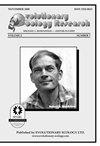饥饿对木栗雄性繁殖成功的影响
Q2 Agricultural and Biological Sciences
引用次数: 26
摘要
背景:饥饿是已知的减少雄性繁殖成功的三角狼。饥饿的雄性转移的精子较少,但我们不知道繁殖成功率降低是由于雌性产卵率较低还是未受精卵更频繁地沉积造成的。研究生物:赤粉甲虫(鞘翅目:拟甲科)。问题:雄性的营养状况是否会影响雌性的产卵率和/或受精能力?受精时雌性精子的使用是否反映了饥饿的雄性精子移植数量的减少?假设:如果雌性释放的精子数量反映了储存的精子数量,我们可以预期,如果与饥饿的雄性交配,每个卵子的精子数量会更低。方法:我们评估了雌性与喂食和饥饿雄性交配的产卵率和受精率。我们还通过在新鲜卵子上对dapi染色的精子头进行显微镜计数来定量精子的使用。结果:雌性与饥饿的雄性交配产卵的可能性更小,产卵量也更少。此外,与饥饿雄鱼交配的雌鱼的卵子精子数量较少,而这些雌鱼产卵的未受精卵比例显著高于饥饿雄鱼。根据每个卵子的精子数量,我们估计,对于饥饿的雄性来说,接近受精地点的精子大约少了三分之一。本文章由计算机程序翻译,如有差异,请以英文原文为准。
Impacts of starvation on male reproductive success in Tribolium castaneum
Background: Starvation is known to decrease male reproductive success in Tribolium castaneum. Starved males transfer less sperm, but we do not know whether reduced reproductive success is caused by lower oviposition rates of females or more frequent deposition of unfertilized eggs. Study organism: The red flour beetle Tribolium castaneum (Coleoptera: Tenebrionidae). Questions: Does the nutritional state of a male influence female oviposition rate and/or fertilization capability? Does sperm use by females at fertilization reflect reduced numbers of sperm transferred by starved males? Hypothesis: If the number of sperm released by females reflects the number of sperm stored, we would expect the number of sperm per egg to be inferior if mated with starved males. Methods: We assessed female oviposition rate and fertilization capability in females mated with fed versus starved males. We also quantified sperm use via microscopical counts of DAPI-stained sperm heads on freshly deposited eggs. Results: Females mated with starved males were less likely to deposit eggs and deposited fewer eggs. Furthermore, the eggs of females mated with starved males had fewer sperm, and those females laid a significantly higher proportion of unfertilized eggs. Based on our counts of sperm per egg, we estimate that for starved males, about a third less sperm come close to the site of fertilization.
求助全文
通过发布文献求助,成功后即可免费获取论文全文。
去求助
来源期刊

Evolutionary Ecology Research
生物-进化生物学
自引率
0.00%
发文量
0
审稿时长
>12 weeks
期刊介绍:
Evolutionary Ecology Research publishes original research contributions focusing on the overlap between ecology
and evolution. Papers may treat any taxon or be general. They may be empirical, theoretical or a combination of the two.
EER prefers conceptual contributions that take intellectual risks or that test ideas.
 求助内容:
求助内容: 应助结果提醒方式:
应助结果提醒方式:


